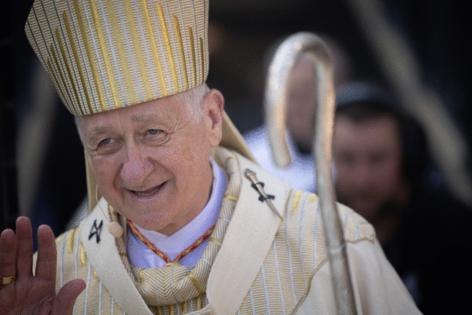Commentary: A public fight among Illinois bishops is hurting the church and the nation
Published in Religious News
The public clash between Chicago Cardinal Blase Cupich and Springfield Bishop Thomas Paprocki over whether U.S. Sen. Dick Durbin should receive a lifetime achievement award from the Archdiocese of Chicago’s Keep Hope Alive program has spilled into the public square with damaging effect.
What might have been an internal disagreement has instead exposed the deepening divisions among American Catholic bishops on questions of doctrine, faith and morals. The spectacle suggests a widening and perhaps unbridgeable gap between conservative-leaning bishops and their more progressive colleagues.
The Catholic Church in the United States has too often mirrored the polarization of the wider nation. It is all too common to see bishops and Catholic institutions align themselves with particular politicians, ideologies or policy agendas. Yet while the church must take positions on matters that affect the common good, it cannot allow itself to become entangled in the culture wars to the point in which its prophetic and moral voice is drowned out by partisan noise.
Durbin, an Illinois Democrat, ultimately declined the award, sparing the archdiocese and the Catholic Church in the U.S further escalation. Yet the damage was done. Two bishops at odds in public, with ideological tribes rallying behind them, has weakened the church’s credibility as moral conscience of the nation. Cupich defended the award as recognition of Durbin’s long advocacy for immigrants. Paprocki countered with the U.S. bishops’ 2004 statement: Catholic institutions should not honor those who act in defiance of fundamental moral principles. For him, Durbin’s record on abortion rights made the award impossible.
Into this controversy stepped Pope Leo XIV, the first American pope and a son of Illinois. His words carried a particular resonance: “Someone who says, ‘I’m against abortion, but I’m in favor of the death penalty,’ is not really pro-life. Someone who says, ‘I’m against abortion, but I’m in agreement with the inhuman treatment of immigrants,’ I don’t know if that’s pro-life.”
By linking abortion with other violations of human dignity, the pope recalled late Chicago Archbishop Joseph Bernardin’s vision of a “consistent ethic of life” or “seamless garment.”
Bernardin had insisted that life issues are interwoven: abortion, capital punishment, war, poverty, racism, the plight of migrants, and the care of the sick and dying. His point was not that all issues are equal but that they are morally linked. To champion the unborn while ignoring the poor is incoherent; to defend the marginalized while dismissing the unborn is equally incoherent.
Cupich echoed this appeal, lamenting the dangerously deepening divisions in the Catholic community and urging his brother bishops to help Catholics embrace the church’s teaching “as a consistent whole.” At stake is nothing less than the integrity of Catholic witness.
I call this “a total picture” approach to moral and ethical reasoning and action that upholds both the teaching of the church and respects those who disagree with it, including Catholics who have not come to the same moral judgment. Everyone does not come to the same moral judgment at the same time.
The temptation on both sides is Catholic reductionism — the narrowing of the church’s identity into a single-issue religion. Conservatives often reduce Catholic witness to abortion and traditional marriage while neglecting poverty, the plight of migrants, racism, advocacy for nonviolence, the death penalty or gun violence. Progressives sometimes reduce Catholicism to social change on gender and sexuality while deemphasizing the church’s teaching on the unborn and some of the ancient liturgical traditions and liturgies of the church.
But Catholic tradition has always insisted on breadth, coherence and the whole. Bernardin’s consistent ethic of life flows from a deeper theological principle: nexus mysteriorum, the connection of mysteries. Every truth of faith is organically related to every other; every moral demand is connected to all moral virtues, all united around Christ and the Gospel. To isolate one doctrine from the rest distorts the whole. Likewise, a moral witness severed from the full spectrum of human dignity and the common good ceases to be Catholic.
Augustine spoke of the totus christus, the “whole Christ” of head and members. Christ and the church are one body. Every wound to human dignity is a wound to Christ himself. Augustine once told his congregation: “Rejoice — we have become Christ!” This is the deepest foundation of a consistent ethic of life: To disregard the vulnerable is to disregard Christ.
The Catholic Church in America now stands at a crossroads, and the risk is that the church becomes just another partisan voice, its moral clarity lost in the din. Yet in many African traditions, crossroads are sacred spaces of decision. They are places to pause, reflect, reconcile and discern the way forward.
This quarrel over Durbin’s award is not just about one senator. It is a symptom of deeper fractures. But it can also be a moment of decision. American Catholic leaders can continue down the path of ideological tribes and partisan entanglement. Or they can pause and recover the deeper Catholic tradition of unity, coherence and credibility. They can choose the seamless garment proposed by Bernardin over the torn cloak and the totus christus over partial identities.
As the pope reminded us in response to this public spat, no one knows the whole truth. But the church, faithful to its own deepest instincts, can walk together in search of it. American Catholic leaders must embrace the wholeness of their own tradition — the consistent ethic of life, the total vision of the church, the unity of the body of Christ. Only then can American Catholicism reclaim its voice as conscience to the nation and sign of hope to the world.
____
Stan Chu Ilo is a Catholic priest and a senior research professor on religion, global health and social ethics at the Center for World Catholicism and Intercultural Theology at DePaul University in Chicago.
___
©2025 Chicago Tribune. Visit at chicagotribune.com. Distributed by Tribune Content Agency, LLC.









Comments